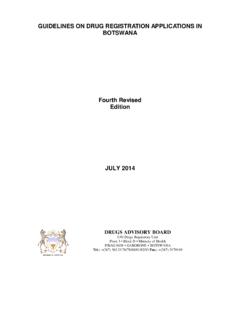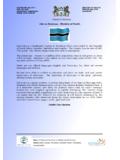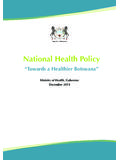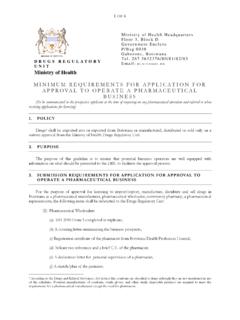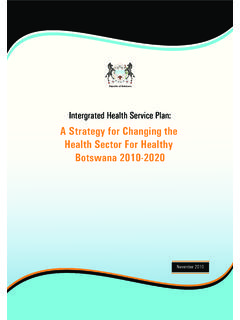Transcription of Botswana National HIV/AIDS
1 Botswana National HIV/AIDS . Treatment Guidelines : 2008 Version November 1, 2008, Edition These guidelines are also available on the Masa page of the website of the Ministry of Health: Contents Forward ..7. Preface ..8. Acknowledgements ..9. Changes in the November 1, 2008, Edition ..10. Editorial Notes ..15. HIV Prevention: Sexual and Workplace Transmission .. 20. Prevention of Sexual Transmission Prevention of Healthcare Workplace Transmission Sexually Transmitted Infections and Their Treatment Screening and Testing for HIV Infection in Botswana .. 22. Diagnosis of HIV Infection in Patients 18 Months of Age and Older Diagnosis of HIV Infection in Patients less than 18 Months of Age Acute HIV Infection CD4 and Clinical Screening: Preventive and Supportive Care ..26. Determination of CD4 Count/% and WHO Clinical Stage Preventive and Supportive Care Special Pediatric and Adolescent Considerations Cotrimoxazole Prophylaxis Nutritional Support for HIV-Infected Adults and Adolescents Other Routine Interventions in HIV/AIDS Care Indications for Initiation of HAART.
2 34. Indications for HAART Initiation in Infants and Children Indications for HAART Initiation in Adolescents and Adults Monitoring Patients Who Are Not Yet Eligible for HAART. HAART Initiation and Follow-up ..37. Baseline Evaluation and Preparation for HAART Initiation Recommended First and Second Line Regimens in Botswana Third Line Regimens Goals of ARV Therapy Recommended Schedules for Monitoring of Patients on HAART. Switching ARVs for Toxicity or Severe Side Effects ARV-Related Hyperlipidemia and Its Management TB/HIV Co-Infection . 60. HAART Initiation in TB/HIV Co-Infection Drug Interactions Between ATT and ARVs Management of ATT/HAART-Induced Hepatitis Clinical Care of HIV-Infected Women (Non-Pregnant and Pregnant), HIV- Exposed Infants, and HIV-Infected Infants, Children, and General Clinical Care of HIV-Infected Women ARV-Related Clinical Care of Non-Pregnant HIV-Infected Women Reproductive Choices in the Setting of HIV Infection Clinical Care of Pregnant HIV-Infected Women and PMTCT.
3 Neonatal ARV Interventions for PMTCT. Non-ARV Interventions for PMTCT. Care of HIV-Exposed Infants Modification of Infant Feeding Practices 2. Special Aspects of Care of HIV-Infected Infants, Children, and Adolescents Treatment Failure and Its Management ..78. Causes of Treatment Failure Clinical Approach to Treatment Failure Switching ARV Therapy for Treatment Failure Special Considerations in Treatment Failure Clinical Review of Detectable Viral Loads Recognition and Management of Treatment Failure When Monitoring Laboratory Results Are Not Available HIV Specialist Panel Failure Management Clinics and Teams Post-Exposure Prophylaxis (PEP) ..89. PEP and Occupational Exposure to HIV. PEP and Other Indicated Care for Victims of Sexual Violence Pre- and Post-Sexual Prophylaxis HIV and Occupational Health Surgery and Medically Invasive Procedures on HIV-Infected Patients Management of Opportunistic Infections and Other HIV-Related Conditions ..96. Cryptococcal Meningitis Tuberculosis Kaposi's Sarcoma Neurological Disease Peripheral Neuropathy aids Dementia Complex Spinal Cord Disease and Myelopathy Herpes Simplex Varicella-Zoster CMV Retinitis Mucocutaneous Candidiasis Bacterial Pneumonia Pneumocystis Jeroveci Pneumonia Lymphoid Interstitial Pneumonitis Chronic Diarrhea Immune Reconstitution Inflammatory Syndrome Appendix: Protocol for Special Order ARV Drugs.
4 107. a) Procedure for Approval of Special Order ARV Drugs b) Procedure to Ensure Availability of ARV Drugs STI Algorithms ..110. IPT Algorithm ..118. WHO Pediatric Dosing Charts .. 119. Table of ARVs for Adults, Their Dosages and Common Side Effects/Toxicities ..141. Tanner Staging ..146. Failure Management Registry ..147. 3. List of Abbreviations and Symbols (Non-ARV): >, < greater than, less than aids acquired immunodeficiency syndrome ALT alanine aminotransferase AST aspartate aminotransferase ATT anti-tuberculosis therapy ART antiretroviral therapy ARV antiretroviral BD twice a day BMD bone mineral density BMI body mass index CDC United States Centers for Disease Control CMV cytomegalovirus CSF cerebral spinal fluid CTX cotrimoxazole Ccreat creatinine clearance DBS dried blood spot DS double-strength CTX (= 2 single-strength CTX). DNA PCR DNA polymerase chain reaction E ethambutol ELISA enzyme-linked immunosorbant assay FBC full blood count GFR glomerular filtration rate H isoniazid HAART highly active antiretroviral therapy HBsAg hepatitis B surface antigen HBV hepatitis B virus HCW healthcare worker HgB hemoglobin HIV human immunodeficiency virus, type 1 (HIV-1).
5 Hrs hours HSV herpes simplex virus ICP intracranial pressure INH isoniazid IPT isoniazid preventive therapy IRIS immune reconstitution inflammatory syndrome IV intravenous kg kilogram KS Kaposi's sarcoma LIP lymphoid interstitial pneumonitis LP lumbar puncture (spinal tap). mg milligram mL milliliter mmol millimole mos months L microliter (cubic millimeter, mm3). MDR-TB multidrug-resistant tuberculosis MOH Botswana Ministry of Health MTCT mother-to-child transmission (of HIV). 4. NNRTI non-nucleoside reverse transcriptase inhibitor NRTI nucleoside reverse transcriptase inhibitor NtRTI nucleotide reverse transcriptase inhibitor OD once daily OI opportunistic infection PCP pneumocystis carinii (now jeroveci) pneumonia PEP post-exposure prophylaxis PI protease inhibitor PID pelvic inflammatory disease PMTCT prevention of mother-to-child transmission (of HIV). po by mouth, orally q every, , q3hours= every 3 hours QID four times a day R rifampicin S streptomycin sd-NVP single-dose nevirapine SJS Stevens-Johnson syndrome STI sexually transmitted infection SMX sulfamethoxazole SS single-strength CTX (TMP 80mg/SMX 400mg).
6 TAM thymidine analogue mutation TB mycobacterium tuberculosis TDS three times a day TC total cholesterol TG triglycerides TMP trimethoprim ULN upper limit of normal VL viral load WHO World Health Organization VZV varicella-zoster virus XDR-TB extensively drug-resistant tuberculosis Z pyrazinamide ARV Abbreviations: AZT (zidovudine, ZDV). 3TC (lamivudine). FTC (emtricitabine). d4T (stavudine). ddI (didanosine). ABC (abacavir). TDF (tenofovir). NVP (nevirapine). EFV (efavirenz). LPV/r (ritonavir-boosted lopinavir [ Kaletra, Aluvia ]). NFV (nelfinavir). SQV (saquinavir). RTV (ritonavir). DRV (darunavir). RAL (raltegravir). r ( low dose ritonavir, usually 100mg dose). 5. Free-of-Charge On-Line HIV/AIDS Educational Information for Clinicians: x x x x x x 6. Forward Botswana 's response to its HIV/AIDS crisis has been one of gradual expansion of comprehensive care for its HIV-infected citizens, such that Botswana is regarded as the beacon of hope for the rest of the continent suffering from HIV/AIDS .
7 With the release of the 2008 National HIV/AIDS Guidelines, the nation is again enacting important, incremental improvements in the scope and depth of its HIV/AIDS . programs, while still ensuring that its resources are being put to the best possible use for all of its citizens. Whereas internationally accepted HIV/AIDS standards have been integrated as much as possible into these revised guidelines, there are instances where the guidelines have been modified to reflect Botswana 's ongoing experience in HIV/AIDS care, as well as its resources. Moreover, these guidelines are fully consistent with current Botswana PMTCT, testing, and TB guidelines. These guidelines, which are valid for both public and private patients, are not a substitute for clinical judgment. In consultation with an HIV Specialist, there will be instances in which, for an individual patient, the practitioner must deviate from them. Nonetheless, it is expected these 2008 revised guidelines represent a major step forward for the Botswana National HIV/AIDS Program, and will further enhance the already comprehensive care the nation provides its people living with HIV/AIDS .
8 Dr. L. Mazhani, Deputy Permanent Secretary/Director of Health Services Ministry of Health May 1, 2008. 7. Preface Revision of the 2005 Botswana Guidelines on Antiretroviral Treatment has been a major collaborative endeavor, involving the time, dedication, and expertise of many major stakeholders. The members of the Committee for the Clinical Care of HIV/AIDS in Botswana represent a spectrum of important participants in the country's HIV/AIDS programs, including the Ministry of Health, the private sector, partner institutions, and medical aid schemes. The Committee has organized Botswana 's HIV/AIDS Guidelines into a comprehensive document, integrating into it the principles of ARV therapy, prevention, testing, STI management, PMTCT, failure management, HIV/TB co- infection, and OI treatment. Pediatric and adolescent issues in HIV/AIDS care have been given special emphasis. The Ministry of Health will work with the committee to disseminate these guidelines, as well to provide practitioner training on the changes therein.
9 In addition, the Ministry of Health looks forward to working with the Committee in monitoring and evaluating clinic and practitioner application of these guidelines. Dr. K. Seipone, Director Department of HIV/AIDS Prevention and Care Ministry of Health May 1, 2008. 8. Acknowledgements Undertaking a task of this magnitude involves the hard work and tireless dedication of many individuals and organizations, working together in a concerted manner. Masa, the Botswana National ARV Program, Ministry of Health, wishes to be the first to acknowledge the commitment of members of the Committee for the Clinical Care of HIV/AIDS in Botswana for their collective efforts in developing these guidelines: Dr. T. Gaolathe, Director, BHP-PEPFAR DHAPC Program Dr. D. Baxter, Clinical Advisor for ARV and PMTCT Programs, Ministry of Health Dr. A. Avalos, HIV care Advisor, Masa ARV Program, Ministry of Health K. Keapoletswe, Coordinator, PMTCT Program, Ministry of Health Dr. M. Mine, Consultant Virologist, Botswana -Harvard Reference Laboratory, Gaborone J.
10 Tlale, Assistant Coordinator, PMTCT Program, Ministry of Health A. Busang, Principal Laboratory Technician, Botswana -Harvard Laboratory, Gaborone Dr. H. Moffat, Chairman, National Standing Committee on Drugs, Ministry of Health Dr. V. Sebako, National Standing Committee on Drugs, Ministry of Health Dr. S. Selelo, Drug Regulatory Unit, Ministry of Health M. Tebogo, Drug Regulatory Unit, Ministry of Health Dr. J. Masunge, Superintendent, Nyangabgwe Referral Hospital, Francistown Dr. H. Jibril, Department of Pediatrics, Princess Marina Hospital, Ministry of Health Dr. W. Wester, Botswana Harvard Partnership Dr. W. Disasi, Senior Care and Treatment Advisor, BOTUSA. Dr. J. Hafkin, University of Pennsylvania Dr. E. Lowenthal, Botswana -Baylor Children's Center of Excellence Dr. C. Wester, Botswana Harvard Partnership Dr. D. Dickinson, Private Practitioner, Gaborone Dr. N. Nwanko, Private Practitioner, Gaborone Dr. G. Tirelo, Private Practitioner, Gaborone Dr. K. Mompati, Private Practitioner, Francistown D.



